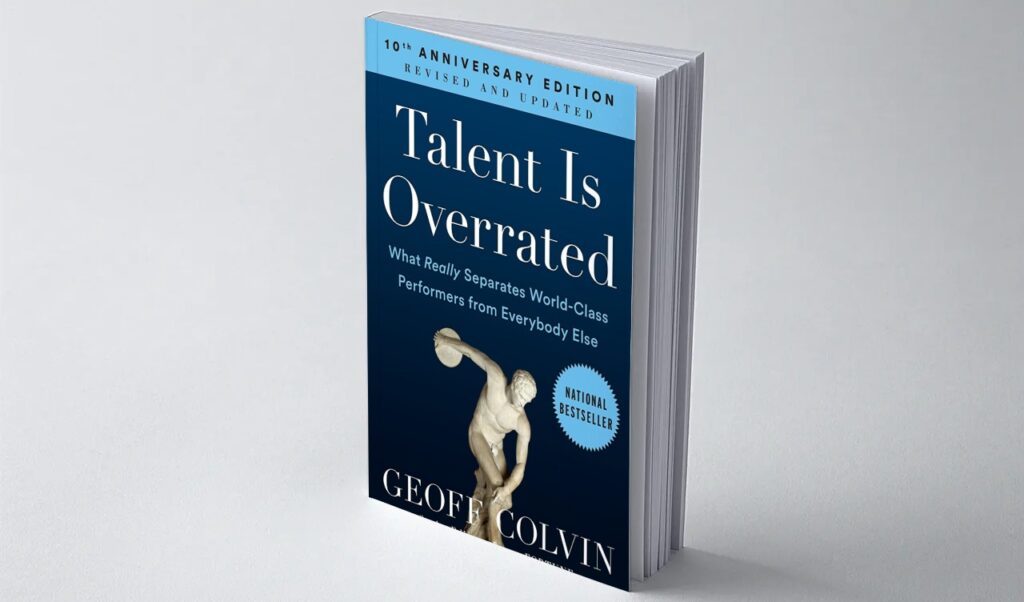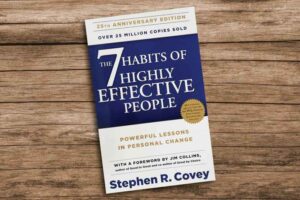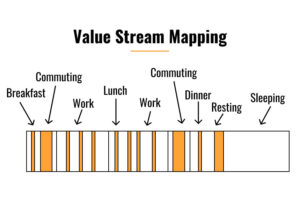Download this executive summary in PDF: Talent Is Overrated by Geoff Colvin
Chapter 1 – The Mystery
- Most people never reach outstanding performance even if they practiced for decades.
- On average, experienced managers don’t produce high-caliber outcomes.
- You become fine at your work with hard work but you won’t become a great performer.
- Extraordinary performers may have a gift that they discovered at a younger age.
- Some searchers argue that the “gift” is a myth.
- High performers have average IQ.
- Deliberate practice is the key because they train themselves more efficiently.
- Today the scarce resource is no longer money but human ability.
- With the internet, workers have to compete with other workers around the world.
Chapter 2 – Talent Is Overrated
- Researchers made a study on musicians to try to find if “talent” was a thing. High performers practiced more.
- The elite group practiced 2 hours per day vs 15min for the lowest group.
- Talent: a natural ability to do something better than most people.
- Is someone talented if he needs years of practice to reach this level?
- Parents may be nurturing a skill in their children and call them gifted.
- The science of genomics has not proven yet that it exists genes identify particular talents.
- Mozart’s father was also a musician and a teacher. Mozart’s “talent” probably comes from hard work from a younger age.
- Tiger Wood’s father was a golf addict and also a teacher. Same as Mozart, hard work made the champion.
- Warren Buffet and Bill Gates are other examples of high achievers and there is no evidence that they were going to become great business persons.
Chapter 3 – How Smart Do You Have to Be?
- Memory and intelligence are two key skills for great performance.
- Memory can be trained with practice.
- IQ measures general intelligence but doesn’t measure social skills, honesty, or wisdom.
- Higher intelligence doesn’t necessarily correlate with higher performance (ex: salesperson).
- IQ is a decent predictor of performance on an unfamiliar task, but once a person has been at a job for a few years, IQ predicts little or nothing about performance.
- A high IQ is not a prerequisite to extraordinary achievement.
- We are limited by our physical constraints (ex: height)
- Experience, inborn abilities, intelligence, and memory don’t automatically drive high performance.
Chapter 4 – A Better Idea
- Jerry Rice is a football player, he spent little time playing football but designed his practice around his specific needs.
- In a study, the best violinists put more hours of lifetime practice.
- “The differences between expert performers and normal adults reflect a life-long period of deliberate effort to improve performance in a specific domain.”
Chapter 5 – What Deliberate Practice Is and Isn’t
- Deliberate practice is an activity designed specifically to improve performance, often with a teacher’s help; it can be repeated a lot; feedback on results is continuously available; it’s highly demanding mentally, whether the activity is purely intellectual, such as chess or business-related activities, or heavily physical, such as sports; and it isn’t much fun.
- Deliberate practice requires that one identify certain sharply defined elements of performance that need to be improved, and then work intently on them.
Chapter 6 – How Deliberate Practice Works
- High performers have better perceptions and interpretations of the indicators that average performers don’t even notice.
- They anticipate the future to be better prepared and detect better the information.
- They also have more knowledge in their field. By understanding deeper the problem, they have better strategies to solve problems.
- Long-term working memory: top performers understand their field at a higher level and thus have a superior structure for remembering information about it.
- Expert’s superior memory doesn’t extend beyond their field of expertise.
- The more you practice the more you have myelination of your neurons.
Chapter 7 – Applying the Principles in Our Lives
- First, define what you want to accomplish.
- Then design the first steps of your deliberate practice.
- Practicing directly:
- The music model: analyze a speech and its elements, and get feedback after each repetition.
- The chess model: compare your decision with the one chosen by your mentor (case study).
- The sports model: working on critical specific skills.
- Practicing in the work:
- Before the work: deliberate practice requires that one identify certain sharply defined elements of performance that need to be improved, and then work intently on them.
- During the work: self-observation with metacognition (knowledge about your knowledge, thinking about your thinking).
- After the work: self-evaluation compared to their standards.
- Deepening your knowledge: become an expert in your field, build a mental model of your domain. The model helps you distinguish relevant from irrelevant information, and enables you to project what will happen next.
Chapter 8 – Applying the Principles in Our Organizations
- Deliberately put managers into stretch jobs that will require them to learn and grow.
- Give short-term work assignments outside of the person’s expertise to stretch him.
- Encourage them to be active in their communities to learn new skills.
- Mentoring and candid feedback.
- Deliberate practice through inspiration.
- Invest time, energy, and money.
- Make leadership development part of the culture.
- Develop teams, not just individuals (risks are low trust, competing agendas, unresolved conflicts, unwillingness to face the real issues).
Chapter 9 – Performing Great at Innovation
- As products and technologies are becoming commoditized, innovation and creativity are becoming even more valuable by the day.
- Inspiration striking the genius is a myth, you need around 10 years of deliberate practice to get the “inspiration”.
- Knowledge is not a burden that limits people’s creativity.
- Technical innovation comes from the improvement of existing technologies.
- Organizations are not innovative, only people are.
- Give clear direction on what kind of innovations are valuable for the organization.
- Authorize your team to innovate and fail, extrinsic motivation (money) is not required.
Chapter 10 – Great Performance in Youth and Age
- With rising standards and knowledge, you need more effort to hope to excel.
- A supporting home environment enables a person to start developing early.
- Parents choose the teachers for their children and invest time, money, and energy.
- Need the combination of a stimulating and supporting environment to get an attentive and engaged student.
- Aging makes people slow down but doesn’t impact the performance of an expert in his field (musician, chess player, athletes).
- To maintain the performance, the expert still needs deliberate practice.
Chapter 11 – Where Does the Passion Come From?
- Deliberate practice is difficult and not funny but high performers may enjoy the practice.
- Intrinsic drive is more powerful than extrinsic drive.
- The extrinsic motivation that is controlling reduces creativity.
- In an organization, employees are discouraged because they don’t have the opportunity to work on projects they selected by themselves and because when they get promoted, they have more responsibilities and less freedom.
- High performers are not born with “passion” but find their intrinsic motivation later.
- Multiplier effect: “Each increase in competencies is matched to a better environment, and, in turn, the better environment will be expected to further enhance their competence.”
- To start the multiplier effect, starting deliberate practice earlier makes the child feel he is special, and begin learning skills where competition is sparse.
Download this executive summary in PDF: Talent Is Overrated by Geoff Colvin








